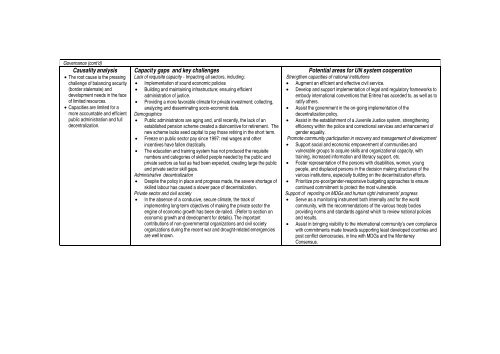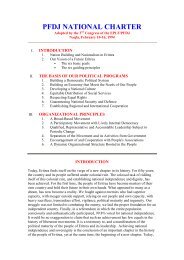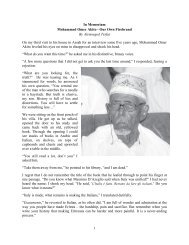Common Country Assessment (CCA) - ECSS | Eritrean Center for ...
Common Country Assessment (CCA) - ECSS | Eritrean Center for ...
Common Country Assessment (CCA) - ECSS | Eritrean Center for ...
Create successful ePaper yourself
Turn your PDF publications into a flip-book with our unique Google optimized e-Paper software.
Governance (cont’d)<br />
Causality analysis<br />
• The root cause is the pressing<br />
challenge of balancing security<br />
(border stalemate) and<br />
development needs in the face<br />
of limited resources.<br />
• Capacities are limited <strong>for</strong> a<br />
more accountable and efficient<br />
public administration and full<br />
decentralization.<br />
Capacity gaps and key challenges<br />
Lack of requisite capacity - Impacting all sectors, including:<br />
• Implementation of sound economic policies<br />
• Building and maintaining infrastructure; ensuring efficient<br />
administration of justice.<br />
• Providing a more favorable climate <strong>for</strong> private investment; collecting,<br />
analyzing and disseminating socio-economic data.<br />
Demographics<br />
• Public administrators are aging and, until recently, the lack of an<br />
established pension scheme created a disincentive <strong>for</strong> retirement. The<br />
new scheme lacks seed capital to pay those retiring in the short term.<br />
• Freeze on public sector pay since 1997: real wages and other<br />
incentives have fallen drastically.<br />
• The education and training system has not produced the requisite<br />
numbers and categories of skilled people needed by the public and<br />
private sectors as fast as had been expected, creating large the public<br />
and private sector skill gaps.<br />
Administrative decentralization<br />
• Despite the policy in place and progress made, the severe shortage of<br />
skilled labour has caused a slower pace of decentralization.<br />
Private sector and civil society<br />
• In the absence of a conducive, secure climate, the track of<br />
implementing long-term objectives of making the private sector the<br />
engine of economic growth has been de-railed. (Refer to section on<br />
economic growth and development <strong>for</strong> details). The important<br />
contributions of non-governmental organizations and civil society<br />
organizations during the recent war and drought-related emergencies<br />
are well known.<br />
Potential areas <strong>for</strong> UN system cooperation<br />
Strengthen capacities of national institutions<br />
• Augment an efficient and effective civil service.<br />
• Develop and support implementation of legal and regulatory frameworks to<br />
embody international conventions that Eritrea has acceded to, as well as to<br />
ratify others.<br />
• Assist the government in the on-going implementation of the<br />
decentralization policy.<br />
• Assist in the establishment of a Juvenile Justice system, strengthening<br />
efficiency within the police and correctional services and enhancement of<br />
gender equality.<br />
Promote community participation in recovery and management of development<br />
• Support social and economic empowerment of communities and<br />
vulnerable groups to acquire skills and organizational capacity, with<br />
training, increased in<strong>for</strong>mation and literacy support, etc.<br />
• Foster representation of the persons with disabilities, women, young<br />
people, and displaced persons in the decision making structures of the<br />
various institutions, especially building on the decentralization ef<strong>for</strong>ts.<br />
• Prioritize pro-poor/gender-responsive budgeting approaches to ensure<br />
continued commitment to protect the most vulnerable.<br />
Support of reporting on MDGs and human right instruments’ progress<br />
• Serve as a monitoring instrument both internally and <strong>for</strong> the world<br />
community, with the recommendations of the various treaty bodies<br />
providing norms and standards against which to review national policies<br />
and results.<br />
• Assist in bringing visibility to the international community’s own compliance<br />
with commitments made towards supporting least developed countries and<br />
post conflict democracies, in line with MDGs and the Monterrey<br />
Consensus.





